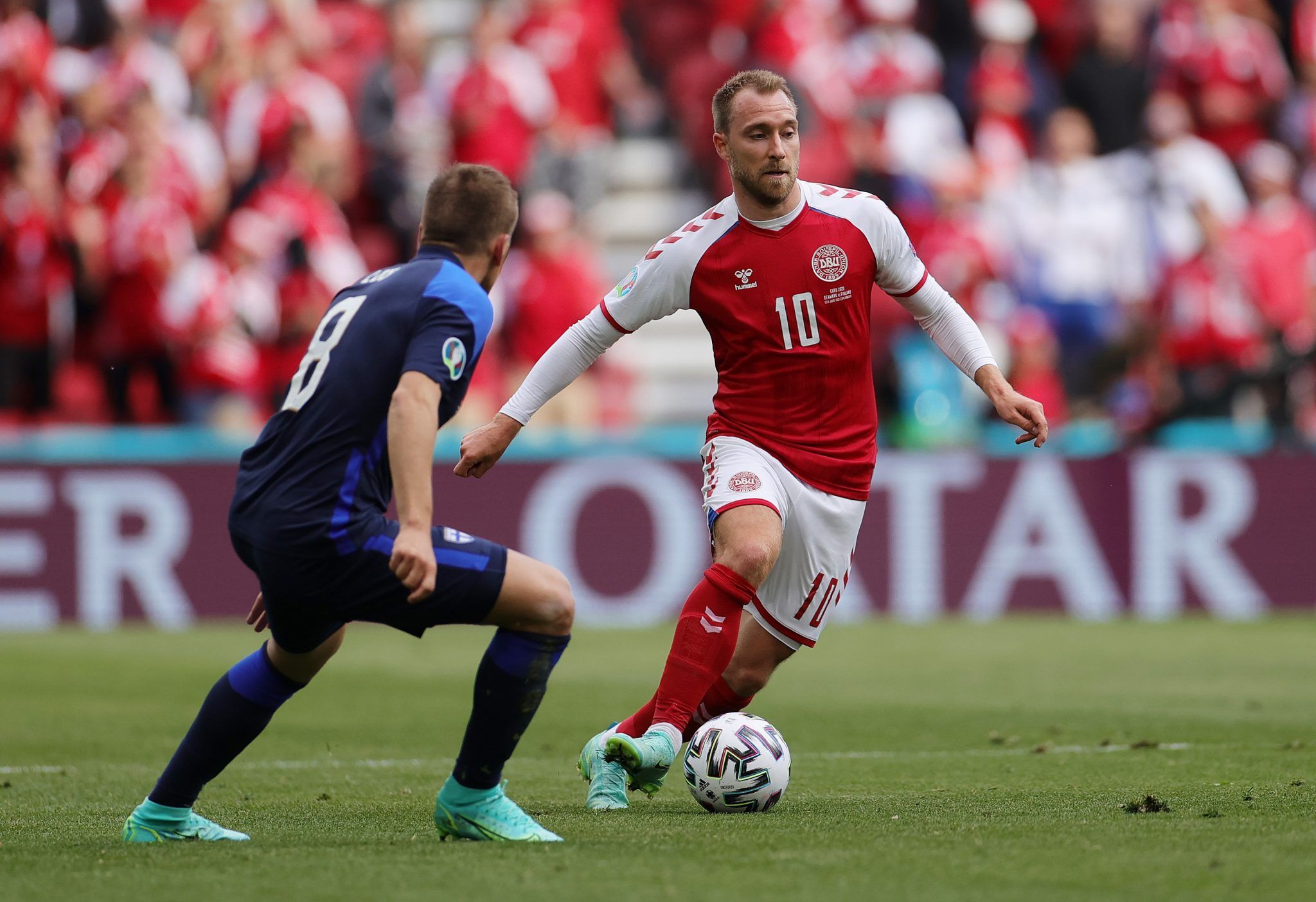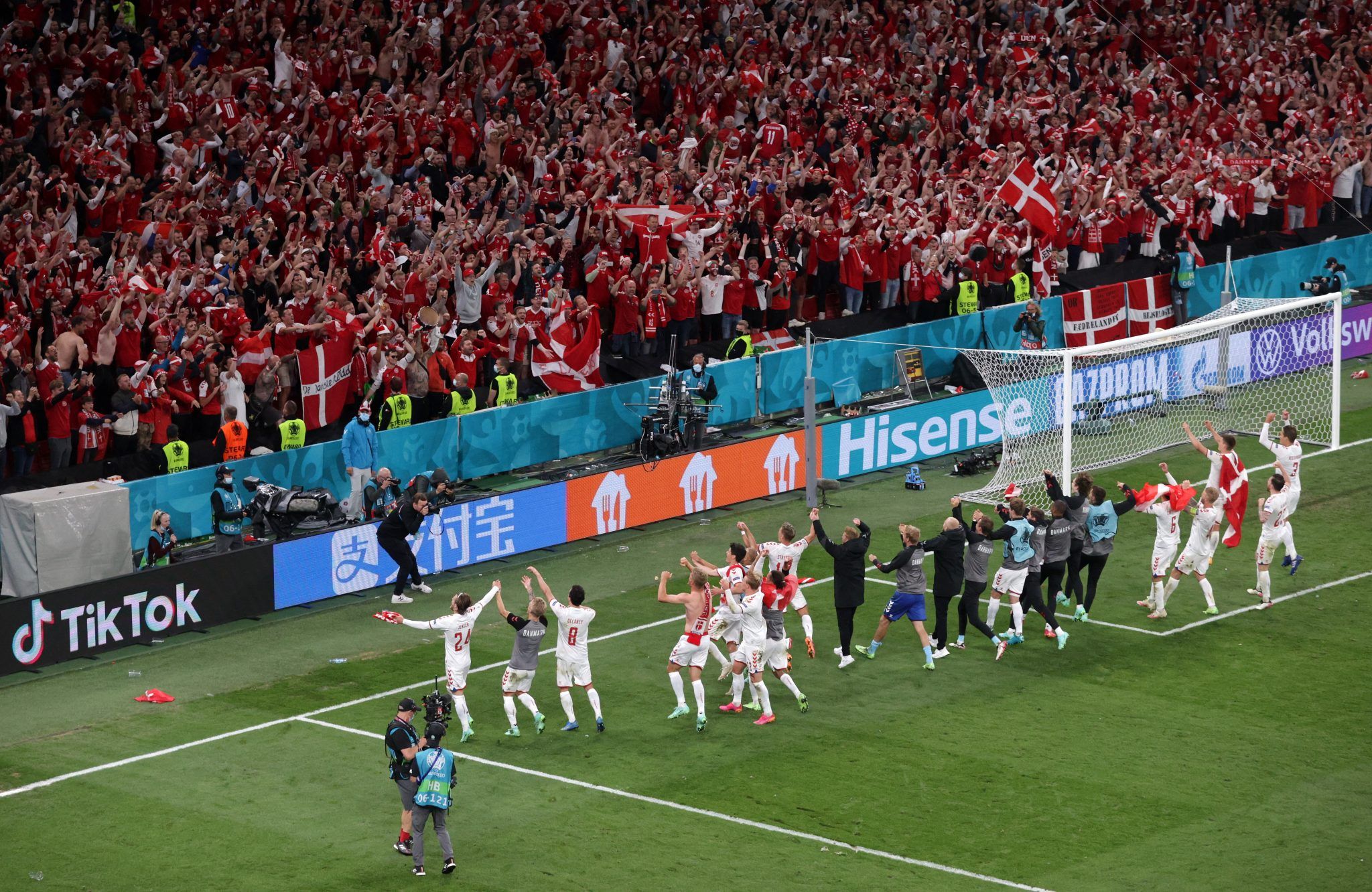
Football

Share
6th July 2021
05:47pm BST

 Eriksen's tournament lasted just 42 minutes.
"Even now, knowing that he is doing better, I get goosebumps talking about it," says Sebastian Stanbury, journalist for Danish football magazine, Tipsbladet.
Stanbury was one of thousands in attendance at Copenhagen's Parken Stadium for the first game, against Finland. He saw Eriksen fall. He recalls the traumatic moments that followed as the gravity of the situation swiftly became clear.
"I was scared," he admits. "Luckily, I was with some good friends to support me because I cried a lot. I was not alone, either. Lots of people were the same. It was a horrific experience for everyone.
"I've talked to Christian a few times when he's been with the national team. I'm not a friend of his and he probably doesn't even know my name, but in Denmark, we all feel a connection to him, like we all know him somehow.
"We've seen him grow up. Since he was 17, he was supposed to be our great hope. The one who would take us back to the top. He did that.
"From being that young, he's always been there. It’s hard to explain, but because of that, he feels almost indestructible. Seeing that happen to him, there, in front of all of us, it was so scary."
Remembering those images of Eriksen's teammates, many of them tearful as they formed a protective ring around him, it's hard to believe they were able (or allowed) to finish the game that same day. That they are now two victories away from repeating their improbable triumph at Euro 92 is nothing short of miraculous.
Eriksen's tournament lasted just 42 minutes.
"Even now, knowing that he is doing better, I get goosebumps talking about it," says Sebastian Stanbury, journalist for Danish football magazine, Tipsbladet.
Stanbury was one of thousands in attendance at Copenhagen's Parken Stadium for the first game, against Finland. He saw Eriksen fall. He recalls the traumatic moments that followed as the gravity of the situation swiftly became clear.
"I was scared," he admits. "Luckily, I was with some good friends to support me because I cried a lot. I was not alone, either. Lots of people were the same. It was a horrific experience for everyone.
"I've talked to Christian a few times when he's been with the national team. I'm not a friend of his and he probably doesn't even know my name, but in Denmark, we all feel a connection to him, like we all know him somehow.
"We've seen him grow up. Since he was 17, he was supposed to be our great hope. The one who would take us back to the top. He did that.
"From being that young, he's always been there. It’s hard to explain, but because of that, he feels almost indestructible. Seeing that happen to him, there, in front of all of us, it was so scary."
Remembering those images of Eriksen's teammates, many of them tearful as they formed a protective ring around him, it's hard to believe they were able (or allowed) to finish the game that same day. That they are now two victories away from repeating their improbable triumph at Euro 92 is nothing short of miraculous.
 Finland won that first game by a single goal. Højbjerg spurned the chance to equalise from the penalty spot late on. Days later, Belgium beat them 2-1, despite a spirited performance. Nobody, given the circumstances, was complaining.
Finland won that first game by a single goal. Højbjerg spurned the chance to equalise from the penalty spot late on. Days later, Belgium beat them 2-1, despite a spirited performance. Nobody, given the circumstances, was complaining.
"From the Finland match to the Belgium game, no one really talked about football," Stanbury recalls. "Nobody had really thought about how well Denmark would play without Christian Eriksen because, well, it just didn't seem to matter a whole lot."
Prior to the Belgium game, a large Denmark shirt featuring Eriksen's name and number 10 was unfurled on the Parken turf. Supporters joined together for a spontaneous rendition of You'll Never Walk Alone before kick-off. Their final group game against Russia, one they had to win to stand a chance of qualifying, was another emotionally charged occasion. Denmark surged to a 4-1 victory, booking their place in the knockout stages. "I've never experienced the kind of atmosphere at Parken as I have in those two games," Stanbury adds. "I don't think I sat down once. "The way they have played considering all that has happened is amazing. I have been to all the games. To Amsterdam, to Baku. Sometimes I stop and think ‘wow, the best player is not there and they’ve reached the semis.' It’s incredible." Denmark's momentum has continued from the Russia game. A 4-0 win over Wales in the last-16 saw them reach the quarter-finals with Czech Republic. It is impossible to look at their run and ignore the romance to it, the feeling that the Danish players have been fuelled by a sense of destiny. Hjulmand, who has been sporting a special bracelet in honour of their absent talisman, has never shied away from talking about the inspiration he and his players have derived from what happened to Eriksen.
Hjulmand, who has been sporting a special bracelet in honour of their absent talisman, has never shied away from talking about the inspiration he and his players have derived from what happened to Eriksen.
"The whole world of football understood that second, and the days after, the fundamental things in life and in football, the fundamental values of football came through right at that moment," he told reporters after the quarter-final in Baku.
"There are so many other agendas in football, but we all remembered why we started to play football, what values football is based on and we had a reminder of this.
"I am still thinking of Christian every single day. He should have been here."
Simon Kjær, too, spoke of how the events of the opening day had galvanised he and his team.
"With what happened to Christian and how we managed to get back on track," he said. "It has been extraordinary. The support and this feeling of being a band of brothers."
And so to Wembley where, one way or another, be it on Wednesday or next Sunday night, Denmark's Euro 2020 will come to an end. No fans will travel from Denmark for the game at Wembley due to restrictions, but thousands are anticipated to watch the game on big screens in Copenhagen.
"You know, this tournament has been one these players have looked forward to for a while," Stanbury says. "There's an interview Højbjerg did when he was about 17 or 18, where he predicted Denmark would win Euro 2020. He was one of the best of a group of new young players coming through then, and he said he thought we could win it.
"We might not be the favourites. We might not have our best player. But can you imagine, after all of this, if we did?"
Explore more on these topics: